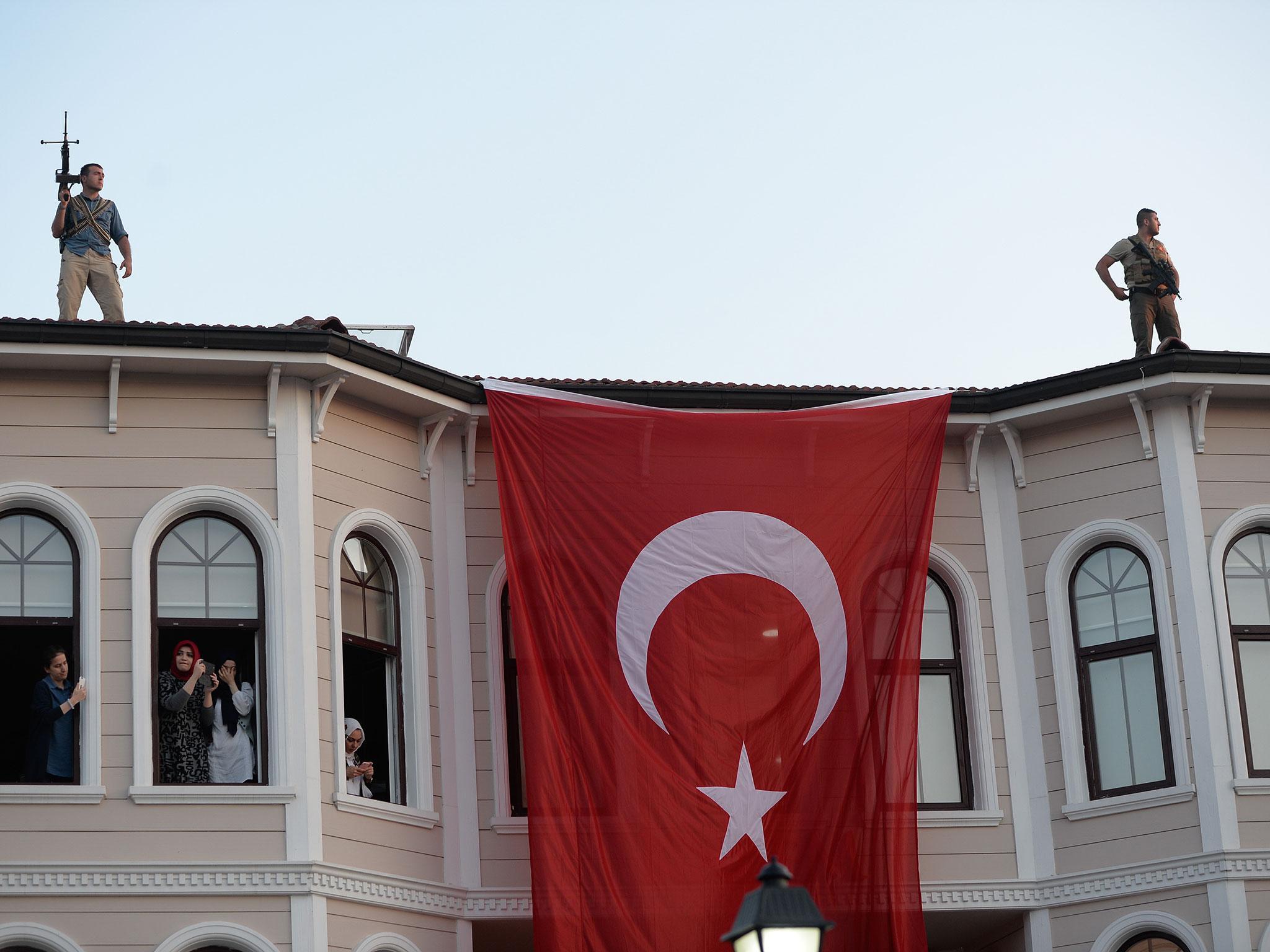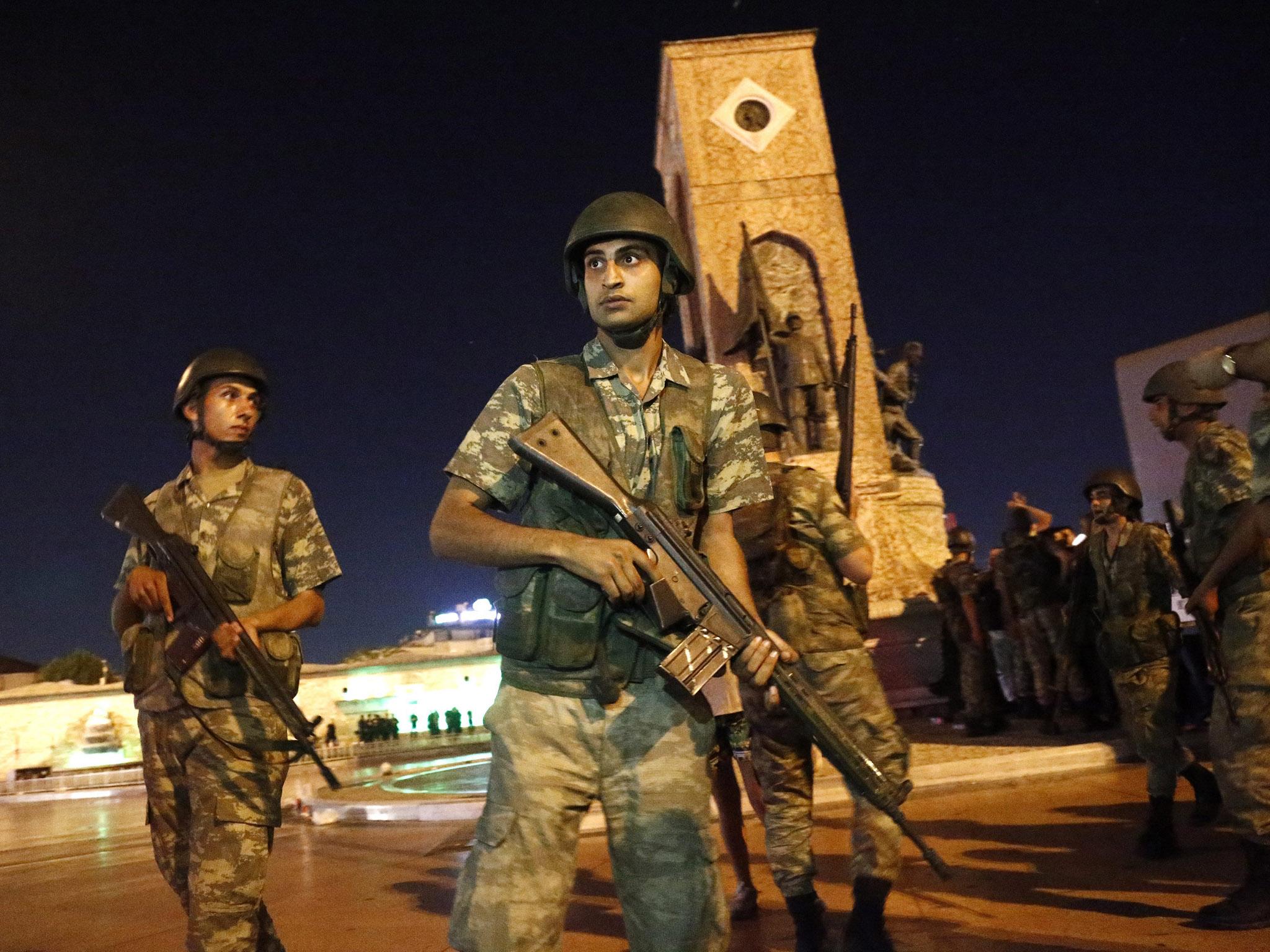Turkey coup: President Erdogan purges military insurgents after failed rebellion as thousands on streets in support
Thousands are removed from the army and judiciary with officials claiming they could face the death penalty

Turkey's President Recep Tayyip Erdogan has moved quickly to stem the fallout of an attempted military coup by purging thousands of his enemies from the army and judiciary.
Around 265 people were said to have died in clashes during the putsch - which saw clashes on both the streets and in the air. Government officials said the number of civilians killed was 161, while 104 'coup plotters' also died. More than 1,400 people were also said to have been injured during the violence on Friday and into Saturday.
The government declared the situation under control on Saturday, saying 2,839 people had been rounded up, from foot soldiers to senior officers, including those who formed “the backbone” of the rebellion. Around 2,700 judges also dismissed with local media reporting that the judges and others in judicial positions were also ordered to be detained for having 'links to plotters'.
Among those detained from the army were top military commanders, including the head of the Second Army which protects the country's borders with Syria, Iraq and Iran, state-run Anadolu news agency said.
Turkey's Prime Minister Binali Yildirim also proposed that the constitution be changed to allow for the plotters to be executed. The death penalty was abolished in Turkey in 2004, though an execution has not been carried out in the country since 1984.
The coup attempt began late on Friday, with a military statement saying forces had seized control “to reinstall the constitutional order, democracy, human rights and freedoms, to ensure that the rule of law once again reigns in the country, for law and order to be reinstated.”
Fighter jets buzzed overhead, gunfire erupted outside military headquarters and vehicles blocked two major bridges in Istanbul. Soliders also seized airports and raided TV stations.
Fighting continued into the early morning of Saturday, with huge blasts echoing across Istanbul and Ankara, including at least one bomb that hit the parliament complex, scattering broken glass and other debris across a lobby. CNN-Turk said two bombs hit near the presidential palace, killing five people and wounding others.
Eventually, CNN-Turk showed dozens of soldiers walking among tanks with their hands held up, surrendering to government forces. The Hurriyet newspaper, quoting investigators, said some privates had thought they were on military maneuvers, not a coup attempt.

A Blackhawk military helicopter with seven Turkish military personnel and one civilian landed in the Greek city of Alexandroupolis, where the passengers requested asylum. While Turkey demanded their extradition, Greece said it would hand back the helicopter and consider the men's asylum requests.
Thousands of Mr Erdogan's supporters had taken to the streets in the early hours of Saturday after a call from the Turkish President to do so as he made his way back to Istanbul from his holiday. Turkish officials — including the president, the prime minister and the interior minister — repeated that call later on Saturday urging supporters to come out to city squares again overnight to defend democracy — and thousands responded.
Thousands have gathered in Ankara's Kizilay Square. Crowds waving Turkish flags on Saturday night chanted “martyrs are immortal, our land is cannot be divided!”
Nusret Tuzak, a government supporter in Ankara, told the Associated Press: “We are here for democracy, so the country lasts, the wellness of the public. This is our country. I'm against the coup as a retired soldier. We don't want to any coup attempt so that's why we are standing here.”
Massive crowds also gathered in Istanbul's neighborhood of Kisikli, in Izmir's Konak Square, and in the northeastern city of Erzincan.
Turkey's four main political parties released a joint declaration strongly condemning the attempted coup and warned that any attempt against the people or the parliament will be met “with the iron will of the Turkish Grand National Assembly resisting them, just as they did today.”
The declaration praised the Turkish nation for its unwavering belief in democracy and lauded citizens for taking to the streets and resisting the coup.
A “black stain” has been left on Turkey’s democracy by the coup, Mr Yildirim said, and many citizens appeared to agree. The highest trending hash tag on Turkish social media was #Idamistiyorum – meaning 'I want the death penalty'.
Those responsible "will pay a heavy price for their treason", President Erdogan vowed. Addressing supporters late on Saturday, he said demands for a return to capital punishment “may be discussed in parliament”.

Prime Minister Binali Yildirim also heeded the popular cry for the strongest possible penalties. Outside parliament, crowds shouted "We want the death penalty!” The PM simply replied: "We got your message. The necessary will be done."
Speaking in an emergency parliamentary session later, Mr Yildirim said the rebels were “not soldiers” and called them “ravenous terrorist butchers in uniforms”.
He warned that anyone who tried to harm the will of the people would be "reminded of those coup plotters, whose lives have been snuffed out."
The identity of many of the plotters remains unclear. Blame for the attempted ousting was quickly levelled by Mr Erdogan and his government at Fethullah Gulen, an Islamic cleric living in self-exile in the US. The ruling AK party has had a bitter rivalry with Gulen since 2013 and frequently blames it for instability in the country.
But Mr Gulen has denied involvement, telling the Guardian: “I don’t believe that the world believes the accusations made by President Erdoğan”. He added it could be used as an excuse to further attack his followers.

The Turkish government has now called for Mr Gulen’s extradition. President Erdogan said the country had never turned back any extradition request for "terrorists" by the United States.
A Turkish official told AP that the government "has been preparing a formal application with detailed information about Gulen's involvement in illegal activities. After last night we have one more thing to add to an already extensive list."
There were fears across Europe and the US about the potential destabilisation within a Nato member and major US ally that lies between the European Union and the chaos of Syria, with Isis bombers targeting Turkish cities and the government also at war with Kurdish separatists.
The US has repeatedly backed Turkey's government in the wake of the coup, while it has also not ruled out extradition of Mr Gulen. Secretary of State John Kerry said any request would be entertained but added solid evidence of wrongdoing would be necessary. President Barack Obama has pledged to cooperate with Turkish government in an effort to maintain safety and stability following the coup attempt.

Boris Johnson, the new British foreign secretary, said it was “crucial that we [the UK] support the democratic institutions of Turkey”. He also urged British citizens in the country, or planning to go there, to follow Foreign Office travel advice which stated on Saturday that people should not leave their homes or hotels, and should avoid public places.
Mr Johnson will discuss the coup at talks in Brussels on Sunday night with Federica Mogherini, high representative of the EU for foreign affairs and security policy.
Other European nations expressed concern with French President Francois Hollande saying on Saturday that he expected a period of repression in Turkey in the aftermath of the failed coup.
“Now we shall what the situation is in Turkey. If its president has completely regained control, which I think is the case, we shall have a period of considerable calm, but there will probably be repression,” Mr Hollande said.
Associated Press contributed to this report
Join our commenting forum
Join thought-provoking conversations, follow other Independent readers and see their replies
Comments
Bookmark popover
Removed from bookmarks